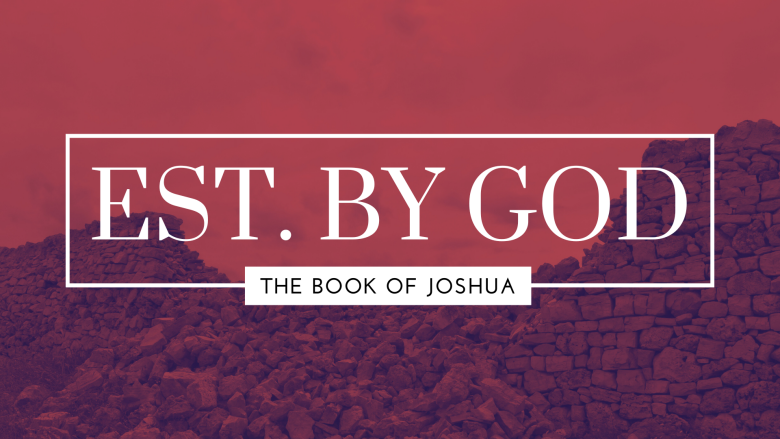Est. By God | The Book of Joshua
Remembering God’s Faithfulness
Point I: Memorials of Faith Remind Us of God's Past Provision (4:6-7)
Word Study:
"Sign" (אוֹת / "ot"): The word "sign" often refers to something that points beyond itself to a greater reality or truth. In the Old Testament, a "sign" is a mark, token, or memorial that acts as a reminder or indicator of divine intervention (e.g., the rainbow in Genesis 9:12).
"Memorial" (זִכָּרוֹן / "zikkaron"): A "memorial" is something set up to help people remember an important event or covenant with God. It comes from the root word meaning "to remember."
Two Key Points from Joshua 4:6-7:
1. God's Faithfulness Must Be Remembered and Shared Across Generations
- Explanation: The stones were not just for the generation that crossed the Jordan; they were specifically meant for future generations to ask about and understand God's mighty works.
2. Memorials Encourage Faith in God’s Future Promises
- Explanation: The stones not only pointed back to God's work in the past but also built faith for what was to come.
Point II: Remembrance Fuels Future Faithfulness (4:18)
Word Study:
"Set their feet" (כַּף / "kaf"): The word "kaf" in Hebrew refers to the hollow or sole of the foot. The significance of the priests’ feet stepping out of the Jordan onto dry ground serves as a clear marker of the end of the miracle. It was the priests’ movement that initiated the return of the waters, symbolizing that the miraculous intervention was tied to their obedience.
"Returned" (שָׁבוּ / "shābū"): The verb "shābū" means "to return" or "to go back." In this context, it underscores that the Jordan River immediately reverted to its natural state, once the priests exited the river. This highlights God’s absolute control over the elements and shows that the miracle was temporary, purposeful, and sovereignly controlled.
"Flood stage" (מָלֵא / "malé"): The phrase “ran at flood stage” emphasizes the extremity of the natural conditions. The Jordan River typically swells during harvest season, making it a formidable barrier. The fact that God held back a river in full flood emphasizes the scale of the miracle and the complete reversal of natural conditions at His command.
Two Key Points from Joshua 4:18:
1. God’s Power Over Creation and His Sovereignty in Timing
- Explanation: The return of the Jordan’s waters as soon as the priests set their feet on dry ground underscores God’s control over creation.
2. Obedience Precedes Miraculous Breakthroughs
- Explanation: The priests carrying the Ark of the Covenant acted in complete obedience, standing in the river until the entire nation crossed, and then stepping out only when commanded. Their obedience marked the end of the miracle and the return of the waters.
Point III: God’s Actions Not Only Strengthen the Faith of His People But Serve as a Witness to the Nations (4:24)
Word Study:
"Peoples of the earth" (עַמֵּי הָאָרֶץ / "‘ammê hā’āreṣ"): This phrase refers to all the nations or groups of people across the globe, beyond just Israel. It demonstrates the universal scope of God’s power and purpose, indicating that God's work was intended to be known beyond Israel, affecting all of humanity.
"Hand" (יָד / "yād"): In the Bible, "hand" is often used metaphorically to refer to strength, power, or authority. Here, "the hand of the Lord" symbolizes His mighty, active intervention in human affairs. It highlights His ability to change circumstances with His power and sovereign will.
"Powerful" (חֲזָקָה / "ḥăzāqāh"): This adjective comes from the root word meaning "strong" or "mighty." It stresses God's overwhelming might, which is made visible through His works. The crossing of the Jordan River was an act that displayed God’s unmatched strength.
"Fear" (יִרְאָה / "yir’āh"): This word is often translated as "fear" but in this context, carries a sense of awe, reverence, and deep respect for God. It is not merely being afraid but having a reverent recognition of God’s holiness and power. It indicates that one should live in a way that reflects the understanding of who God is.
Two Key Points from Joshua 4:24:
1. God's Mighty Acts Are Meant to Be a Witness to All Nations
- Explanation: The parting of the Jordan River was not just for Israel's benefit but was intended to show God's power to the entire world.
2. God's Power Should Lead to a Life of Reverence and Worship
- Explanation: The second half of the verse focuses on the Israelites' response: they were to "fear the Lord your God forever." The miracle of the Jordan River was meant to produce a lasting reverence and awe in their hearts.
Series Information

